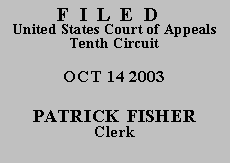

| ALFORD RAY BRADLEY, |
|
| v. | |
| TWYLA MASON GRAY, |
The standard of review for dismissal of a complaint on judicial-immunity grounds is generally de novo. Ledbetter v. City of Topeka, 318 F.3d 1183, 1187 (10th Cir. 2003). This court has not yet resolved, however, whether a dismissal of a complaint as frivolous should be reviewed for abuse of discretion or de novo. See Plunk v. Givens, 234 F.3d 1128, 1130 (10th Cir. 2000). Thus, the standard of review is somewhat open to question. In any event, this matter need not be resolved in the instant case, because there is no reversible error under either standard.
It is firmly established that judges enjoy absolute immunity from suit for all "judicial acts" unless they have acted "in the clear absence of all jurisdiction." Stump v. Sparkman, 435 U.S. 349, 35657 (1978). This immunity "protect[s] judicial independence by insulating judges from vexatious actions prosecuted by disgruntled litigants." Forrester v. White, 484 U.S. 219, 225 (1988) (citing Bradley v. Fisher, 80 U.S. (13 Wall.) 335, 348 (1872)).
The "judicial acts" for which judges enjoy immunity include all functions normally performed by a judge when the parties deal with the judge in her judicial capacity. Stump, 435 U.S. at 362. Plaintiff's suspicions that Judge Gray was biased against him are unavailing. Immunity for judicial acts cannot "be affected by the motives with which [they] are performed." Bradley, 80 U.S. (13 Wall.) at 347. Nor does the fact that Plaintiff brought a § 1983 action alter the applicability of this doctrine. See Pierson v. Ray, 386 U.S. 547, 55455 (1967).
The acts for which Plaintiff sued Judge Gray--namely the manner in which she conducted a state post-conviction hearing and the sanctions she handed down therein--are clearly "judicial acts." Further, Judge Gray was acting within her jurisdiction. As a county judge, she has jurisdiction over all local criminal matters. Judge Gray therefore enjoys absolute immunity in this case.
For the foregoing reasons, and in the absence of any relevant contrary showing in Plaintiff's appellate brief, we conclude that Plaintiff's appeal is frivolous. We therefore DISMISS his appeal under 28 U.S.C. § 1915(e)(2)(B)(i), and DENY his motion to proceed without prepayment of costs or fees.
The district court's dismissal of Plaintiff's complaint counts as a strike for the purposes of 28 U.S.C. § 1915(g). Our dismissal of this appeal also counts as
a strike against Plaintiff for the purposes of § 1915(g). See Jennings v. Natrona County Detention Ctr. Med. Facility, 175 F.3d 775, 780 (10th Cir. 1999).
ENTERED FOR THE COURT
Harris L Hartz
Circuit Judge
*.After examining the briefs and appellate record, this panel has determined unanimously that oral argument would not materially assist the determination of this appeal. See Fed. R. App. P. 34(a)(2); 10th Cir. R. 34.1(G). The case is therefore ordered submitted without oral argument. This order and judgment is not binding precedent, except under the doctrines of law of the case, res judicata, and collateral estoppel. The court generally disfavors the citation of orders and judgments; nevertheless, an order and judgment may be cited under the terms and conditions of 10th Cir. R. 36.3.